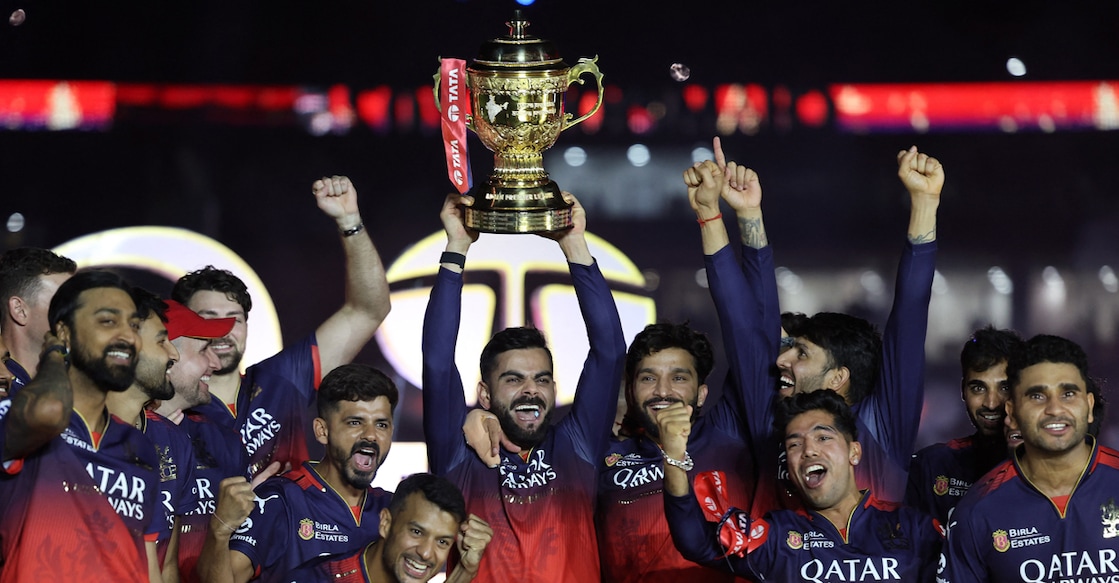Kohli and the lingering wait for that missing mantlepiece

Mail This Article
Royal Challengers Bengaluru (RCB) finally broke the jinx that surrounded them in the Indian Premier League (IPL) by winning the championship on June 3. In a tightly contested final held at the neutral venue of Narendra Modi stadium at Ahmedabad, they defeated Punjab Kings (PBKS) by 6 runs to lift the Cup that had eluded them for 18 years. Though neither of the finalists had won the championship, RCB were the more deserving winners, not only due to their consistency during this tournament but also because this was their fourth appearance in the finals. PBKS had their moments too, but could not repeat the magic they weaved in the semifinals against Mumbai Indians (MI) and had to be content with being the second-best.
In the end, RCB’s better consistency and all-round team effort helped them considerably in their campaign. Their win over PBKS in the first Qualifier helped them gain a psychological advantage over their opponents. PBKS reached the finals through the second Qualifier, where they defeated the highly fancied MI. This also gave a physical advantage to RCB as it helped them get extra rest for a couple of days. These factors tilted the balance in favour of RCB in the final game between two evenly matched sides.
It was in the fitness of things that Virat Kohli finally got to be part of a winning side in IPL. It might appear downright bizarre that a cricketer who was part of teams that won almost all the tournaments conducted by the International Cricket Council (ICC), including the Junior World Cup, 2011 World Cup, 2024 T20 World Cup and Champions trophy (on two occasions) should have to wait for 18 years to achieve a similar goal in IPL. But such are the vagaries of sports that even the most acclaimed athlete is occasionally made to wait an inordinate amount of time to achieve a rather mundane target!

Kohli is the only player in the history of IPL who has turned out for the same franchisee during the entire 18 years of the existence of this league. He was hired by RCB ahead of the first edition of the championship when he was still a rookie, fresh from winning the ICC Under 19 World Cup. Kohli stuck with the same franchisee even as he grew in stature to become one the best batsmen in the world in contemporary cricket. He holds the record for being the highest run-maker in a season (973 runs in 2016), besides being the only player to reach an aggregate of 8,000 runs in this championship. He has won the Orange Cup for scoring the highest run scorer in a season on more than one occasion.
Despite these outstanding personal landmarks, he could not achieve his burning ambition to win the trophy for his franchise. The jokes that did the rounds at the close of each IPL season would only have helped make this desire more intense. Finally, like a fairytale ending, he was granted this wish as he moved to the twilight of his career, making the achievement appear taller, sweeter and much more alluring!
A peep into the history of sports will tell us that Kohli’s is not the first instance of an athlete achieving a long-cherished ambition towards the fag end of his career. Sachin Tendulkar was undoubtedly the best batsman of his generation and would claim a place in the shortest list of all-time great willow wielders who graced this game. There was no record that he did not conquer once he set his mind to it. He remains the most popular cricketer to have graced the game and must be the only one to have been compared with the Almighty. But despite all these personal achievements, which were immensely commendable, Tendulkar felt deficient, solely because his efforts had not helped his side to win the World Cup. When India finally won the World Cup in 2011 in Tendulkar’s home city of Mumbai, the glee on his face was such that no one who saw this would ever forget it. Tendulkar would have gladly exchanged all the records that he created with his bat for winning this championship. And God willed that he attained this dream at 37, two years before he bid adieu to international cricket.

Sunil Gavaskar remains one of the most accomplished batsmen to emerge from India. Besides being the finest in the genre of those who opened the innings, he was amongst the best batsmen in contemporary cricket. His records in the longer-duration version of the game speak for themselves. He was the first batsman to reach the pinnacle of scoring 10000 runs in test matches, and his record of 34 centuries in this arena was broken only many years later. Further, he was the only top-order batsman to face the fearsome fast bowlers of the West Indies of his era without wearing a protective helmet.
In the initial years of limited overs’ cricket, Gavaskar had shown a strong disdain for this version but changed his mindset during his later years through hard work. He was a member of the World Cup-winning national squad of 1983, but his contributions during this championship were rather meagre. He made it known that his greatest remaining ambition was to score a century in One Day Internationals, but it remained unattained until the 1987 World Cup, which he had announced as his swan song. When he crossed the 50-run mark in two matches but could not convert either into a century, most observers felt he was not fated to score a hundred in this version. But destiny had willed otherwise, and he struck a brilliant century against New Zealand in the last league match of this tournament. That match proved to be his penultimate innings in international cricket, and he could thus retire from the game with a century under his belt in limited overs’ cricket.
Lionel Messi is one the best footballers the world has seen, besides being the most decorated one in the history of this popular sport. A master dribbler, he possesses an uncanny ball sense and can easily score goals, even from near-impossible angles. He made his debut for Argentina in 2005 and became the youngest player from his country to score a goal in a World Cup game in 2006. He led Argentina to the finals of 3 international championships, including the World Cup, during the 2014- 16 period without winning any of them. When Argentina lost in the league phase of the 2018 World Cup, one thought that his ambition to lift the World Cup would not be realised. But he worked hard, made a strong comeback, and guided his country to the title triumph in the 2022 World Cup, thus realising his long-cherished dream. It appears that the Almighty had decided that he should wait till his 35th year before this was achieved.

Virginia Wade was the darling of British sports media due to her proficiency on the tennis court and her impeccable manners off it. She surprised one and all by winning the US Open championships in 1968 within a few months after turning a professional. But, other than a victory in the Australian Open in 1972, she found grand slam titles difficult to come by. Even more disappointing was her performance at Wimbledon, where she could not make it to the finals, even once, in the singles event. But in 1977, the centenary year of Wimbledon, which was also the silver jubilee of the coronation of Queen Elizabeth, she attained her dream of winning the championship. At 32, she was on the verge of losing ground to the younger generation of players when she finally managed to achieve her goal.
One wishes to add a footnote here that the Almighty does not shower this bounty on those who openly express contempt for something and then try hard to attain it. A classic example of this is the case of Ivan Lendl, the tennis great of the 1980s. Bred on clay and hard courts, Lendl did not like playing at Wimbledon, where the grass courts did not suit his style of play. He even stayed away from this championship for a couple of years, saying, “Grass is for cows”. But, after winning the other grand slam titles, the realisation dawned on him that his career would be incomplete without adding this trophy to his cupboard. This forced him to focus all his attention and energies on winning this championship, but he could not do so despite reaching the finals on three occasions! His words haunt him, and he retired from the game without winning this title.
Before concluding, this columnist wishes to record his heartfelt condolences for the tragedy that took place in Bengaluru during the function to fete the winning RCB team. I pray for the departed souls and a speedy recovery for those injured in the stampede.


